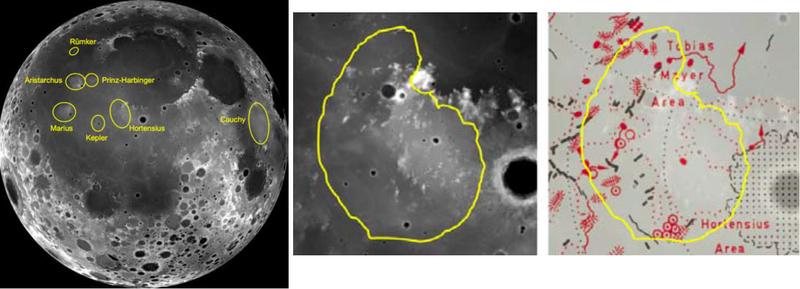Difference between revisions of "January 28, 2011"
| (2 intermediate revisions by one other user not shown) | |||
| Line 6: | Line 6: | ||
<em>images from [http://www.lpi.usra.edu/meetings/lpsc2011/pdf/1367.pdf Spudis, McGovern and Kieffer, LPSC 2011]</em><br /> | <em>images from [http://www.lpi.usra.edu/meetings/lpsc2011/pdf/1367.pdf Spudis, McGovern and Kieffer, LPSC 2011]</em><br /> | ||
<br /> | <br /> | ||
| − | Some years ago I proposed that a large domical structure near Gardner be called a [[September_26,_2004|megadome]]. Now Paul Spudis, Patrick McGovern and Walter Kiefer of the Lunar and Planetary Institute in Houston have proposed the existence of even larger domes that contain well known smaller volcanics. The circles on the LRO LOLA topo image identify the extent of swells they consider to be large shield volcanoes, similar to ones on Mars, Venus and Earth. The T. Mayer - Hortensius swell (middle image) is 300 km wide and 2 km high. The classic [[July_29,_2009|map]] of the same area on the right shows the familiar Hortensius dome cluster and others near T. Mayer as red circles with central dots. While this putative shield, and the Cauchy one, and a smaller one centered on the unrelated Kepler impact crater are previously unsuspected, the shield-like structure of the Marius Hills, Aristarchus Plateau, Harbinger region and | + | Some years ago I proposed that a large domical structure near Gardner be called a [[September_26,_2004|megadome]]. Now Paul Spudis, Patrick McGovern and Walter Kiefer of the Lunar and Planetary Institute in Houston have proposed the existence of even larger domes that contain well known smaller volcanics. The circles on the LRO LOLA topo image identify the extent of swells they consider to be large shield volcanoes, similar to ones on Mars, Venus and Earth. The T. Mayer - Hortensius swell (middle image) is 300 km wide and 2 km high. The classic [[July_29,_2009|map]] of the same area on the right shows the familiar Hortensius dome cluster and others near T. Mayer as red circles with central dots. While this putative shield, and the Cauchy one, and a smaller one centered on the unrelated Kepler impact crater are previously unsuspected, the shield-like structure of the Marius Hills, Aristarchus Plateau, Harbinger region and Rümker are long known. The authors point out that, unlike many shields on other planets, these proposed lunar ones lack summit calderas, radial fissures and flows - does that weaken the interpretation? The confirmation of the existence of these large scale features that seem to have controlled the locations of smaller volcanics is well within the abilities of LPOD readers to investigate. Do topographic transects agree that these swells are real? Are there others? Tomorrow we will discuss new arguments to explain the posiitoning of these proposed large shields.<br /> |
<br /> | <br /> | ||
<em>[mailto:tychocrater@yahoo.com Chuck Wood]</em><br /> | <em>[mailto:tychocrater@yahoo.com Chuck Wood]</em><br /> | ||
| Line 14: | Line 14: | ||
<br /> | <br /> | ||
<strong>Related Links</strong><br /> | <strong>Related Links</strong><br /> | ||
| − | Rükl plate [ | + | Rükl plate [https://the-moon.us/wiki/R%C3%BCkl_30 30]<br /> |
<br /> | <br /> | ||
<p><b>Yesterday's LPOD:</b> [[January 27, 2011|Micro Features]] </p> | <p><b>Yesterday's LPOD:</b> [[January 27, 2011|Micro Features]] </p> | ||
Latest revision as of 13:44, 16 December 2018
Mega-Megadomes

images from Spudis, McGovern and Kieffer, LPSC 2011
Some years ago I proposed that a large domical structure near Gardner be called a megadome. Now Paul Spudis, Patrick McGovern and Walter Kiefer of the Lunar and Planetary Institute in Houston have proposed the existence of even larger domes that contain well known smaller volcanics. The circles on the LRO LOLA topo image identify the extent of swells they consider to be large shield volcanoes, similar to ones on Mars, Venus and Earth. The T. Mayer - Hortensius swell (middle image) is 300 km wide and 2 km high. The classic map of the same area on the right shows the familiar Hortensius dome cluster and others near T. Mayer as red circles with central dots. While this putative shield, and the Cauchy one, and a smaller one centered on the unrelated Kepler impact crater are previously unsuspected, the shield-like structure of the Marius Hills, Aristarchus Plateau, Harbinger region and Rümker are long known. The authors point out that, unlike many shields on other planets, these proposed lunar ones lack summit calderas, radial fissures and flows - does that weaken the interpretation? The confirmation of the existence of these large scale features that seem to have controlled the locations of smaller volcanics is well within the abilities of LPOD readers to investigate. Do topographic transects agree that these swells are real? Are there others? Tomorrow we will discuss new arguments to explain the posiitoning of these proposed large shields.
Chuck Wood
Technical Details
Hooray! On Thursday the abstracts for the upcoming Lunar and Planetary Science Conference appeared, and this paper is just one of hundreds that are now available to read.
Related Links
Rükl plate 30
Yesterday's LPOD: Micro Features
Tomorrow's LPOD: A Moonless Night
COMMENTS?
Register, Log in, and join in the comments.



